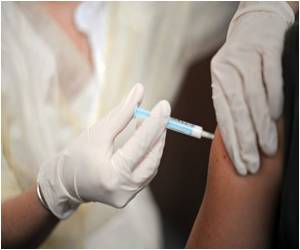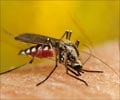In most vaccine recipients, a candidate dengue vaccine developed by NIH scientists was found to be safe and stimulate a strong immune response, show clinical trial results.

Infection with one dengue virus results in immunity to that specific virus but not to the other three. Research shows that the likelihood of severe disease increases when a person is subsequently infected with a different dengue virus. This observation suggests that the ideal dengue vaccine would be tetravalent—that is, protective against all four dengue viruses.
"The global burden of dengue is enormous—and it is growing," said NIAID director Anthony S. Fauci, M.D. "We are cautiously optimistic about these recent clinical trial results with this candidate tetravalent vaccine developed at NIAID; however, much more work still needs to be done."
The Phase I clinical trial, launched in July 2010 and led by principal investigator Anna Durbin, M.D., at Johns Hopkins Bloomberg School of Public Health in Baltimore, tested a single dose of each of four versions of the investigational dengue vaccine TetraVax-DV. The vaccine was developed by scientists in NIAID's Laboratory of Infectious Diseases. It is a live, attenuated vaccine, which means that the viruses it contains are weakened enough such that they do not cause illness but still can induce an immune response. Each of the four vaccines tested included different mixtures of components designed to protect against all four dengue viruses.
The Phase I study was conducted in Baltimore; Burlington, Vt.; and Washington, D.C. The final study analysis included 112 healthy men and women ages 18 to 50 years who had not previously been exposed to dengue or related viruses such as West Nile virus and yellow fever virus.
Participants were randomized into four groups. In each group, 20 volunteers received a single 0.5-milliliter subcutaneous (under the skin) injection of one of the tetravalent candidate vaccine combinations, and eight others received placebo. All were monitored for immediate adverse reactions for at least 30 minutes after vaccination, and subsequently took their body temperatures three times daily for 16 days to check for possible adverse reactions. Participants also received a physical exam every other day up to Study Day 16, and then again on study days 21, 28, 42 and 180, when blood tests were also performed.
Advertisement
"What is promising about TV003 is that it elicited solid antibody responses after just one dose," explained Stephen Whitehead, Ph.D., of NIAID's Laboratory of Infectious Diseases, who led the development of the vaccine candidates. "Other vaccines in development require two or three injections at higher doses to achieve similar results."
Advertisement
"The results of this Phase I dengue vaccine study look very promising, and NIAID scientists and their partners are pursuing further development of TV003," said Kathryn Zoon, Ph.D., director of NIAID's Division of Intramural Research. The researchers are conducting studies to further evaluate the vaccine's safety and ability to stimulate an immune response in healthy volunteers and in people who have been infected previously by dengue or related viruses.
TV003's inexpensive production cost—less than $1 per dose—is critical to its potential use in developing countries, noted Dr. Whitehead. Manufacturers in Brazil, India and Vietnam—countries where dengue is prevalent – have licensed the vaccine technology for production and further evaluation. Phase II trials to evaluate the safety of TV003 and its capacity to create an immune response will begin soon in Brazil and Thailand.
Source-Eurekalert















